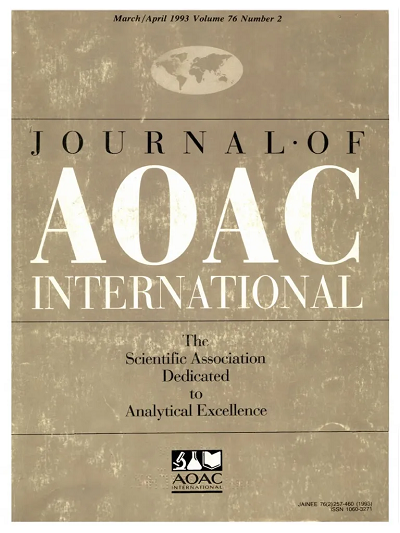Development of Recombinase Aided Amplification (RAA)-Exo-Probe Assay for the Rapid Detection of Shiga Toxin-Producing Escherichia coli.
IF 1.7
4区 农林科学
Q3 CHEMISTRY, ANALYTICAL
引用次数: 0
Abstract
BACKGROUND Shiga toxin-producing Escherichia coli (STEC) is a significant cause of foodborne illness causing various gastrointestinal diseases including hemolytic uremic syndrome (HUS), the most severe form, which can lead to kidney failure or even death. OBJECTIVE Here, we report the development of RAA (Recombinase Aided Amplification)-exo-probe assays targeting the stx1 and stx2 genes for the rapid detection of STEC in food samples. RESULTS These assays were found to be 100% specific to STEC strains and were also highly sensitive with a detection limit of 1.6 × 103 CFU/mL or 32 copies/reaction. Importantly, the assays were able to successfully detect STEC in spiked and real food samples (beef, mutton, and pork), with a detection limit as low as 0.35 CFU/25g in beef samples after an overnight enrichment step. CONCLUSION Overall, the RAA assay reactions completed within ∼20 minutes and were less dependent on expensive equipment, suggesting they can be easily adopted for in field testing requiring only a fluorescent reader. HIGHLIGHTS As such, we have developed two rapid, sensitive, and specific assays that can be used for the routine monitoring of STEC contamination in food samples, particularly in the field or in poorly equipped labs.重组酶辅助扩增(RAA)-外显探针法快速检测产志贺毒素大肠杆菌的建立
背景:产志贺毒素大肠杆菌(STEC)是食源性疾病的重要病因,可引起各种胃肠道疾病,包括溶血性尿毒症综合征(HUS),最严重的形式可导致肾衰竭甚至死亡。目的:在此,我们报道了针对stx1和stx2基因的重组酶辅助扩增(RAA)-外显探针检测方法的发展,用于快速检测食品样品中的产志贺毒素大肠杆菌。方法:设计并优化RAA技术检测stx1和stx2的引物和外探针。然后测试了最佳的产大肠杆菌raa外显探针检测方法的特异性和敏感性,并在加标和真实食品样品中进行了验证。结果:该方法对产志贺毒素大肠杆菌的特异性为100%,检测限为1.6 × 103 CFU/mL或32拷贝/反应,灵敏度高。重要的是,该检测方法能够成功地检测出加标和真实食品样品(牛肉、羊肉和猪肉)中的产大肠杆菌,在隔夜富集步骤后,牛肉样品的检测限低至0.35 CFU/25g。结论:总的来说,RAA测定反应在~ 20分钟内完成,并且对昂贵设备的依赖程度较低,表明它们可以很容易地用于只需荧光阅读器的现场测试。因此,我们开发了两种快速、敏感和特异性的检测方法,可用于食品样品中产志毒素大肠杆菌污染的常规监测,特别是在现场或设备较差的实验室中。
本文章由计算机程序翻译,如有差异,请以英文原文为准。
求助全文
约1分钟内获得全文
求助全文
来源期刊

Journal of AOAC International
医学-分析化学
CiteScore
3.10
自引率
12.50%
发文量
144
审稿时长
2.7 months
期刊介绍:
The Journal of AOAC INTERNATIONAL publishes the latest in basic and applied research in analytical sciences related to foods, drugs, agriculture, the environment, and more. The Journal is the method researchers'' forum for exchanging information and keeping informed of new technology and techniques pertinent to regulatory agencies and regulated industries.
 求助内容:
求助内容: 应助结果提醒方式:
应助结果提醒方式:


